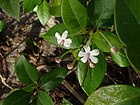Note: This is a project under development. The articles on this wiki are just being initiated and broadly incomplete. You can Help creating new pages.
Difference between revisions of "Clerodendrum inerme"
(→Common names) |
|||
| (One intermediate revision by the same user not shown) | |||
| Line 8: | Line 8: | ||
==Chemical Composition== | ==Chemical Composition== | ||
| − | <ref name="chemical composition"/> | + | Clerodendrum inerme contained cardiac glycosides, anthraquinones, |
| + | proteins, phenolics, flavonoids, saponins, tannins, iridoids, diterpenes, triterpenes, | ||
| + | sterols, steroids, carbohydrates, fixed oils, volatile oils and lignin.<ref name="chemical composition"/> | ||
==Common names== | ==Common names== | ||
| − | {{Common names|sa=Kundali|en=Glory Bower, Indian privet|gu=|hi= | + | {{Common names|sa=Kundali|en=Glory Bower, Indian privet|gu=|hi=Chhotiari|kn=ನಾಯಿತೆಕ್ಕಿಲೆ Naitekkile, Itteru, ಕುಂಡಲಿ ಗಿಡ|ks=|ml=Nirnochi|mr=Sangam|pa=|ta=Sangam|te=Erup-pichha}}<ref name="Common names"/> |
==Properties== | ==Properties== | ||
| Line 65: | Line 67: | ||
==References== | ==References== | ||
<references> | <references> | ||
| − | <ref name="chemical composition">[ | + | <ref name="chemical composition">[https://pdfs.semanticscholar.org/616a/9059b0741810dd6513582f9210c3dc443bfb.pdf Chemical constituents]</ref> |
<ref name="Leaf">[Morphology]</ref> | <ref name="Leaf">[Morphology]</ref> | ||
<ref name="How to plant/cultivate">[Cultivation]</ref> | <ref name="How to plant/cultivate">[Cultivation]</ref> | ||
Latest revision as of 16:42, 7 October 2020
This plant is belings to Verbenaceae family.[1]
Contents
- 1 Uses
- 2 Parts Used
- 3 Chemical Composition
- 4 Common names
- 5 Properties
- 6 Habit
- 7 Identification
- 8 List of Ayurvedic medicine in which the herb is used
- 9 Where to get the saplings
- 10 Mode of Propagation
- 11 How to plant/cultivate
- 12 Commonly seen growing in areas
- 13 Photo Gallery
- 14 References
- 15 External Links
Uses
Eye infection, Fever, Headache, Skin rashes.[2]
Parts Used
[[:Category:Herbs with used in medicine|]], stem.
Chemical Composition
Clerodendrum inerme contained cardiac glycosides, anthraquinones, proteins, phenolics, flavonoids, saponins, tannins, iridoids, diterpenes, triterpenes, sterols, steroids, carbohydrates, fixed oils, volatile oils and lignin.[3]
Common names
| Language | Common name |
|---|---|
| Kannada | ನಾಯಿತೆಕ್ಕಿಲೆ Naitekkile, Itteru, ಕುಂಡಲಿ ಗಿಡ |
| Hindi | Chhotiari |
| Malayalam | Nirnochi |
| Tamil | Sangam |
| Telugu | Erup-pichha |
| Marathi | Sangam |
| Gujarathi | |
| Punjabi | |
| Kashmiri | |
| Sanskrit | Kundali |
| English | Glory Bower, Indian privet |
Properties
Reference: Dravya - Substance, Rasa - Taste, Guna - Qualities, Veerya - Potency, Vipaka - Post-digesion effect, Karma - Pharmacological activity, Prabhava - Therepeutics.
Dravya
Rasa
Guna
Veerya
Vipaka
Karma
Prabhava
Habit
Identification
Leaf
| Kind | Shape | Feature |
|---|---|---|
Flower
| Type | Size | Color and composition | Stamen | More information |
|---|---|---|---|---|
| {{{5}}} |
Fruit
| Type | Size | Mass | Appearance | Seeds | More information |
|---|---|---|---|---|---|
Other features
List of Ayurvedic medicine in which the herb is used
Where to get the saplings
Mode of Propagation
[[:Category:Index of Plants which can be propagated by |]]
How to plant/cultivate
Commonly seen growing in areas
[[:Category:Herbs that are commonly seen in the region of |]], [[:Category:Herbs that are commonly seen in the region of |]], [[:Category:Herbs that are commonly seen in the region of |]], [[:Category:Herbs that are commonly seen in the region of |]], [[:Category:Herbs that are commonly seen in the region of |]].
Photo Gallery
References
- ↑ Karnataka Aushadhiya Sasyagalu By Dr.Maagadi R Gurudeva, Page no:323
- ↑ Indian Medicinal Plants by C.P.Khare
- ↑ Chemical constituents
- ↑ Local names
- ↑ [Morphology]
- ↑ [Cultivation]
External Links
- Ayurvedic Herbs known to be helpful to treat Eye infection
- Ayurvedic Herbs known to be helpful to treat Fever
- Ayurvedic Herbs known to be helpful to treat Headache
- Ayurvedic Herbs known to be helpful to treat Skin rashes
- Herbs with used in medicine
- Herbs with stem used in medicine
- Herbs with common name in Kannada
- Herbs with common name in Hindi
- Herbs with common name in Malayalam
- Herbs with common name in Tamil
- Herbs with common name in Telugu
- Herbs with common name in Marathi
- Herbs with common name in Sanskrit
- Herbs with common name in English
- Habit - A straggling branched shrub
- Index of Plants which can be propagated by
- Herbs that are commonly seen in the region of
- Herbs
- Pages without herbs images



